| Listing 1 - 10 of 11 | << page >> |
Sort by
|
Book
ISBN: 0709922892 9401165610 Year: 1987 Publisher: London : Croom Helm,
Abstract | Keywords | Export | Availability | Bookmark
 Loading...
Loading...Choose an application
- Reference Manager
- EndNote
- RefWorks (Direct export to RefWorks)

ISBN: 0691012172 0691050082 1282753479 1400822637 9786612753473 1400813182 Year: 1998 Publisher: Princeton, NJ Chichester Princeton University Press
Abstract | Keywords | Export | Availability | Bookmark
 Loading...
Loading...Choose an application
- Reference Manager
- EndNote
- RefWorks (Direct export to RefWorks)
Extending the human life-span past 120 years. The "green" revolution. Evolution and human psychology. These subjects make today's newspaper headlines. Yet much of the science underlying these topics stems from a book published nearly 140 years ago--Charles Darwin's On the Origin of Species. Far from an antique idea restricted to the nineteenth century, the theory of evolution is one of the most potent concepts in all of modern science. In Darwin's Spectre, Michael Rose provides the general reader with an introduction to the theory of evolution: its beginning with Darwin, its key concepts, and how it may affect us in the future. First comes a brief biographical sketch of Darwin. Next, Rose gives a primer on the three most important concepts in evolutionary theory--variation, selection, and adaptation. With a firm grasp of these concepts, the reader is ready to look at modern applications of evolutionary theory. Discussing agriculture, Rose shows how even before Darwin farmers and ranchers unknowingly experimented with evolution. Medical research, however, has ignored Darwin's lessons until recently, with potentially grave consequences. Finally, evolution supplies important new vantage points on human nature. If humans weren't created by deities, then our nature may be determined more by evolution than we have understood. Or it may not be. In this question, as in many others, the Darwinian perspective is one of the most important for understanding human affairs in the modern world. Darwin's Spectre explains how evolutionary biology has been used to support both valuable applied research, particularly in agriculture, and truly frightening objectives, such as Nazi eugenics. Darwin's legacy has been a comfort and a scourge. But it has never been irrelevant.
Evolution (Biology) --- Natural selection --- Evolution (Biologie) --- Sélection naturelle --- Social aspects. --- Aspect social --- Sélection naturelle --- Darwinism --- Selection, Natural --- Animal evolution --- Animals --- Biological evolution --- Evolutionary biology --- Evolutionary science --- Origin of species --- Evolution --- Social aspects --- Evolution (Biology) - Social aspects. --- Natural selection - Social aspects. --- Biology --- Biological fitness --- Homoplasy --- Phylogeny --- Genetics --- Variation (Biology) --- Biological invasions --- Heredity

ISBN: 9786610451050 1423765206 160256034X 9781423765202 9780195095302 0195095308 128045105X 9781280451058 0195095308 0195061330 9780195061338 6610451052 9780198022725 0198022727 9781602560345 0190282576 Year: 1991 Publisher: New York : Oxford University Press,
Abstract | Keywords | Export | Availability | Bookmark
 Loading...
Loading...Choose an application
- Reference Manager
- EndNote
- RefWorks (Direct export to RefWorks)
This unique book looks at the biology of aging from a fundamentally new perspective, one based on evolutionary theory rather than traditional concepts which emphasize molecular and cellular processes. The basis for this approach lies in the fact that natural selection, as a powerful determining force, tends to decline in importance with age. Many of the characteristics we associate with aging, the author argues, are more the result of this decline than any mechanical imperative contained within organic structures. This theory in turn yields the most fruitful avenues for seeking answers to the problem of aging, and should be recognized as the intellectual core of gerontology and the foundation for future research. The author ably surveys the vast literature on aging, presenting mathematical, experimental, and comparative findings to illustrate and support the central thesis. The result is the first complete synthesis of this vital field. Evolutionary biologists, gerontologists, and all those concerned with the science of aging will find it a stimulating, strongly argued account.
Aging. --- Evolution. --- Philosophy --- Creation --- Emergence (Philosophy) --- Teleology --- Age --- Ageing --- Senescence --- Developmental biology --- Gerontology --- Longevity --- Age factors in disease --- Physiological effect
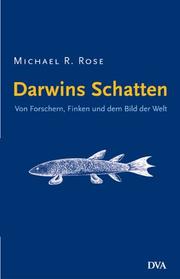
ISBN: 3421053839 Year: 2001 Publisher: Stuttgart Deutsche Verlags-Anstalt
Abstract | Keywords | Export | Availability | Bookmark
 Loading...
Loading...Choose an application
- Reference Manager
- EndNote
- RefWorks (Direct export to RefWorks)
Book
ISBN: 9781400822638 Year: 2000 Publisher: Princeton, NJ
Abstract | Keywords | Export | Availability | Bookmark
 Loading...
Loading...Choose an application
- Reference Manager
- EndNote
- RefWorks (Direct export to RefWorks)
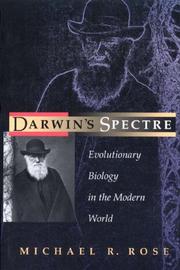
ISBN: 9781400822638 9780691050089 Year: 2000 Publisher: Princeton, N.J. Princeton University Press
Abstract | Keywords | Export | Availability | Bookmark
 Loading...
Loading...Choose an application
- Reference Manager
- EndNote
- RefWorks (Direct export to RefWorks)
Book
ISBN: 1282361058 9786612361050 052094447X 9780520944473 9780520247666 0520247663 9781282361058 9780520261808 0520261801 Year: 2009 Publisher: Berkeley University of California Press
Abstract | Keywords | Export | Availability | Bookmark
 Loading...
Loading...Choose an application
- Reference Manager
- EndNote
- RefWorks (Direct export to RefWorks)
Experimental approaches to evolution provide indisputable evidence of evolution by directly observing the process at work. Experimental evolution deliberately duplicates evolutionary processes-forcing life histories to evolve, producing adaptations to stressful environmental conditions, and generating lineage splitting to create incipient species. This unique volume summarizes studies in experimental evolution, outlining current techniques and applications, and presenting the field's full range of research-from selection in the laboratory to the manipulation of populations in the wild. It provides work on such key biological problems as the evolution of Darwinian fitness, sexual reproduction, life history, athletic performance, and learning.
Animal breeding --- Evolution (Biology) --- Natural selection --- Animal evolution --- Animals --- Biological evolution --- Darwinism --- Evolutionary biology --- Evolutionary science --- Origin of species --- Biology --- Evolution --- Biological fitness --- Homoplasy --- Phylogeny --- Selection, Natural --- Genetics --- Variation (Biology) --- Biological invasions --- Heredity --- Domestic animals --- Breeding --- Experiments. --- Research. --- adaptation. --- allele. --- athletic performance. --- biology. --- charles darwin. --- controlled field manipulations. --- darwinian fitness. --- ecology. --- environmental conditions. --- evolution. --- evolutionary dynamics. --- evolve. --- experimental approaches. --- experimental evolution. --- gene flow. --- genetic drift. --- genetic variation. --- incipient species. --- laboratory experiments. --- learning. --- life history. --- lineage splitting. --- mutation. --- natural selection. --- phenomenon. --- populations in the wild. --- sexual reproduction. --- theoretical.
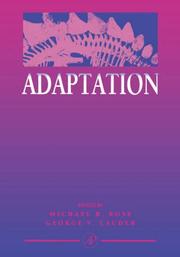
ISBN: 0125964218 012596420X Year: 1996 Publisher: San Diego : Academic Press,
Abstract | Keywords | Export | Availability | Bookmark
 Loading...
Loading...Choose an application
- Reference Manager
- EndNote
- RefWorks (Direct export to RefWorks)
Evolution. Phylogeny --- 575.826 --- #WDIR:wbse --- Adaptation --- Adaptation (Biology) --- Evolution (Biology) --- Natural selection. --- Adaptation (Biology). --- Evolution (Biology). --- 575.826 Adaptation --- Natural selection --- Darwinism --- Selection, Natural --- Genetics --- Variation (Biology) --- Biological invasions --- Heredity --- Animal evolution --- Animals --- Biological evolution --- Evolutionary biology --- Evolutionary science --- Origin of species --- Biology --- Evolution --- Biological fitness --- Homoplasy --- Phylogeny --- Environment --- Self-organizing systems --- Environmental adaptation --- Adaptation, Environmental
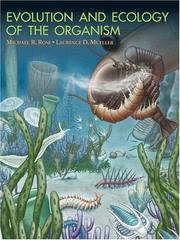
ISBN: 0130104043 Year: 2006 Publisher: Upper Saddle River (N.J.) : Pearson/Prentice Hall,
Abstract | Keywords | Export | Availability | Bookmark
 Loading...
Loading...Choose an application
- Reference Manager
- EndNote
- RefWorks (Direct export to RefWorks)
Evolution (Biology) --- GBZ General Biology, Zoology & Biophilosophy --- biology --- evolutionary biology --- darwinism --- population genetics --- population ecology --- community ecology --- macroevolution --- physiology --- general systematics --- morphology --- Evolution (Biology).
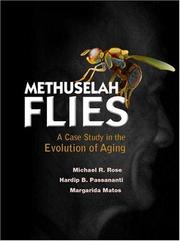
ISBN: 128188071X 9786611880712 9812567224 9789812567222 9781281880710 9812387412 9789812387417 Year: 2004 Publisher: River Edge, N.J. World Scientific
Abstract | Keywords | Export | Availability | Bookmark
 Loading...
Loading...Choose an application
- Reference Manager
- EndNote
- RefWorks (Direct export to RefWorks)
Methuselah Flies presents a trailblazing project on the biology of aging. It describes research on the first organisms to have their lifespan increased, and their aging slowed, by hereditary manipulation. These organisms are fruit flies from the species Drosophila melanogaster, the great workhorse of genetics. Michael Rose and his colleagues have been able to double the lifespan of these insects, and improved their health in numerous respects as well. The study of these flies with postponed aging is one of the best means we have of understanding, and ultimately achieving, the postponement of aging in humans. As such, the carefully presented detail of this book will be of value to research devoted to the understanding and control of aging. Methuselah Flies: is a tightly edited distillation of twenty years of work by many scientists; contains the original publications regarding the longer-lived fruit flies; offers commentaries on each of the topics covered - new, short essays that put the individual research papers in a wider context; gives full access to the original data; captures the scientific significance of postponed aging for a wide academic audience.
Drosophila --- Insects --- Hexapoda --- Insecta --- Pterygota --- Arthropoda --- Entomology --- Drosophilidae --- Fruit-flies --- Aging.
| Listing 1 - 10 of 11 | << page >> |
Sort by
|

 Search
Search Feedback
Feedback About UniCat
About UniCat  Help
Help News
News